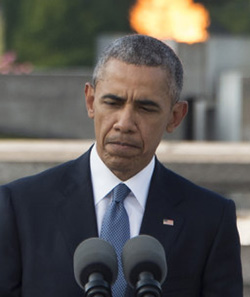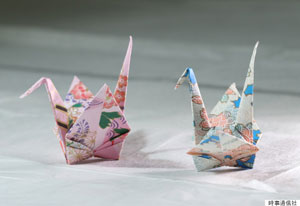Chinese |
Pīnyīn |
>Top
0. Introduction:
- The following is a transcript of President Obama’s speech in Hiroshima, Japan, on Friday, 27 May, 2016, as recorded by The New York Times.
|
0. 序文:
- 2016.5.27金; 広島におけるオバマ大統領のスピーチである。(NY Times紙の記録による)
|
>Top
1. Death fell from the sky:
- Seventy-one years ago, on a bright cloudless morning, death fell from the sky and the world was changed. A flash of light and a wall of fire destroyed a city and demonstrated that mankind possessed the means to destroy itself.
- Why do we come to this place, to Hiroshima? We come to ponder a terrible force unleashed in a not-so-distant past. We come to mourn the dead, including over 100,000 Japanese men, women and children, thousands of Koreans, a dozen Americans held prisoner.
- Their souls speak to us. They ask us to look inward, to take stock of who we are and what we might become.
- It is not the fact of war that sets Hiroshima apart. Artifacts tell us that violent conflict appeared with the very first man. Our early ancestors having learned to make blades from flint and spears from wood used these tools not just for hunting but against their own kind. On every continent, the history of civilization is filled with war, whether driven by scarcity of grain or hunger for gold, compelled by nationalist fervor or religious zeal. Empires have risen and fallen. Peoples have been subjugated and liberated. And at each juncture, innocents have suffered, a countless toll, their names forgotten by time.
- The world war that reached its brutal end in Hiroshima and Nagasaki was fought among the wealthiest and most powerful of nations. Their civilizations had given the world great cities and magnificent art. Their thinkers had advanced ideas of justice and harmony and truth. And yet the war grew out of the same base instinct for domination or conquest that had caused conflicts among the simplest tribes, an old pattern amplified by new capabilities and without new constraints.
|
1. 死が空から舞い降りた:
- 71年前雲一つない明るい朝、死が空から舞い降り、世界は変わった。閃光と火柱が都市を破壊し、人類は自らを破壊する手段を所有していることを示した。
- 我々はなぜこの地、広島に来ているのか。それほど遠くない過去に解き放たれた残虐な力に思慮するためにやって来た。我々は10万人以上の日本人の男・女・子供、何千人もの朝鮮人、十数人の米国人捕虜を悼むために来た。
- その魂が我々に話しかける。彼らは我々に対しもっと内省し、我々が何者なのかを見つめ、どうなり得るのかを訴える。
- 広島を際立たせるのは戦争という事実ではない。過去の遺物は、暴力的な争いが最初の人類とともに出現していたことを教えてくれる。初期の人類は、火打ち石から刃物を作り、木からやりを作り方を学び、これらの道具を狩りだけでなく同じ人類に対しても使った。
- どの大陸でも文明の歴史は戦争で満ちており、食糧不足や黄金への渇望、民族的な情熱や宗教的な狂信に煽られた。帝国は台頭し、衰退した。人々は支配され、解放された。転換点において無実の人々が苦しみ、数多くの人が犠牲となったが、その名前は時と共に忘れ去られてきた。
- 世界大戦は、広島と長崎でもっとも残酷な終焉を迎えたのは、最も豊かで最も強い国家間の戦いであった。彼らの文明は偉大な都市と素晴らしい芸術を育んでい た。思想家は正義と調和、真実という理念を発達させていた。しかし戦争は、初期の部族間で争いを引き起こしてきたのと同様に、支配や征服という基本的本能により生じた。古い様式が新たな能力を得て増幅したが、新たな抑制を伴なわなかった。
|
>Top
2. The capacity of unmatched destruction:
- In the span of a few years, some 60 million people would die. Men, women, children, no different than us. Shot, beaten, marched, bombed, jailed, starved, gassed to death. There are many sites around the world that chronicle this war, memorials that tell stories of courage and heroism, graves and empty camps that echo of unspeakable depravity.
- Yet in the image of a mushroom cloud that rose into these skies, we are most starkly reminded of humanity’s core contradiction. How the very spark that marks us as a species, our thoughts, our imagination, our language, our toolmaking, our ability to set ourselves apart from nature and bend it to our will — those very things also give us the capacity for unmatched destruction.
- How often does material advancement or social innovation blind us to this truth? How easily we learn to justify violence in the name of some higher cause.
- Every great religion promises a pathway to love and peace and righteousness, and yet no religion has been spared from believers who have claimed their faith as a license to kill.
- Nations arise telling a story that binds people together in sacrifice and cooperation, allowing for remarkable feats. But those same stories have so often been used to oppress and dehumanize those who are different.
- Science allows us to communicate across the seas and fly above the clouds, to cure disease and understand the cosmos, but those same discoveries can be turned into ever more efficient killing machines.
- The wars of the modern age teach us this truth. Hiroshima teaches this truth. Technological progress without an equivalent progress in human institutions can doom us. The scientific revolution that led to the splitting of an atom requires a moral revolution as well.
|
2. 無類の破壊能力:
- 数年の間に約60百万人が死んだ。我々と変わらない男・女性・子供達だった。狙撃、殴打、連行、被爆、投獄そして毒ガス受けて死んだ。
- 世界各地には、勇気や勇敢な行動を称える記念碑や、言葉に言い尽くせない悪行を反映する墓や空の収容所などこの戦争を記録する場所が多くある。
- しかし、この空に上がった、きのこ雲の姿によって我々は人類の根本的な矛盾を想起する。我々を人類たらしめる我々の思想、想像力、言語、道具作り、自然と隔絶し自然を我々の意志に従わせる能力、それらのものは無類の破壊能力を我々にもたらした。
- 物質的な進歩や社会的なイノベーションが、何度もこうした事実から我々の目をくらましてきている。崇高な目的のために暴力をどれだけたやすく正当化してきただろうか。
- すべての偉大な宗教は愛や平和や正義への道を約束している。しかしどの宗教もそれらの信条のもとで殺人を犯すことを許されると主張する信者を防ぐことはできなかった。
- 国は人々の犠牲と協力を結びつける物語を持ち上げてきたが、同時に人類を抑圧し、人間性を奪う理由にも使われてきた。
- 科学の力によって、我々は海を越えて対話し、雲の上を飛び、病気を治し、宇宙の真理を理解することができるようになった。しかし同じ科学の発見が、効率的な殺人マシーンを生み出し得る。
- 現代の戦争はこの真実を語っている。広島はこの真実を物語っている。科学の進歩に見合うだけ人間社会に進歩がなければ破滅が訪れる。原子核の分裂をもたらした科学の進化は、同時に道徳の革命も求めている。
|
>Top
3. The courage to escape the logic of fear:
- That is why we come to this place. We stand here in the middle of this city and force ourselves to imagine the moment the bomb fell. We force ourselves to feel the dread of children confused by what they see. We listen to a silent cry. We remember all the innocents killed across the arc of that terrible war and the wars that came before and the wars that would follow.
- Mere words cannot give voice to such suffering. But we have a shared responsibility to look directly into the eye of history and ask what we must do differently to curb such suffering again.
- Some day, the voices of the hibakusha will no longer be with us to bear witness. But the memory of the morning of Aug. 6, 1945, must never fade. That memory allows us to fight complacency. It fuels our moral imagination. It allows us to change.
- And since that fateful day, we have made choices that give us hope. The United States and Japan have forged not only an alliance but a friendship that has won far more for our people than we could ever claim through war. The nations of Europe built a union that replaced battlefields with bonds of commerce and democracy. Oppressed people and nations won liberation. An international community established institutions and treaties that work to avoid war and aspire to restrict and roll back and ultimately eliminate the existence of nuclear weapons.
- Still, every act of aggression between nations, every act of terror and corruption and cruelty and oppression that we see around the world shows our work is never done. We may not be able to eliminate man’s capacity to do evil, so nations and the alliances that we form must possess the means to defend ourselves. But among those nations like my own that hold nuclear stockpiles, we must have the courage to escape the logic of fear and pursue a world without them.
- We may not realize this goal in my lifetime, but persistent effort can roll back the possibility of catastrophe. We can chart a course that leads to the destruction of these stockpiles. We can stop the spread to new nations and secure deadly materials from fanatics. And yet that is not enough. For we see around the world today how even the crudest rifles and barrel bombs can serve up violence on a terrible scale.
- We must change our mind-set about war itself. To prevent conflict through diplomacy and strive to end conflicts after they’ve begun. To see our growing interdependence as a cause for peaceful cooperation and not violent competition. To define our nations not by our capacity to destroy but by what we build. And perhaps, above all, we must reimagine our connection to one another as members of one human race.
- For this, too, is what makes our species unique. We’re not bound by genetic code to repeat the mistakes of the past. We can learn. We can choose. We can tell our children a different story, one that describes a common humanity, one that makes war less likely and cruelty less easily accepted.
|
3. 恐怖の論理から抜け出す勇気:
- それ故我々はこの場所を訪れる。この町の真ん中に立ち、原爆が落とされた時に思いを馳せる。子どもたちが経験した恐怖を思い起こさせる。 声なき悲鳴に耳を傾ける。あの恐ろしい戦争やそれまでの戦争、そして未来の戦争による罪なき犠牲者全員に思いを寄せる。
- 言葉だけではそのような苦しみに声を届けることはできない。歴史を直視し、再び犠牲者を生まないためにどう変えなければいけないのかを問う責任がある。
- いつの日か、被爆者の証人たちの声は聞こえなくなるだろう。だが1945年8月6日の朝の記憶は決して消えない。その記憶は我々に対して独りよがりと戦い、我々の想像力を養い、我々に変化をもたらしている。
- あの運命の日以来、われわれは希望をもたらす選択をしてきた。米国と日本は同盟関係を築くだけでなく、戦争を通じて得られるものよりもっと多くのものを国民にもたらすべく友情を築いてきた。欧州の国々は戦場に代わって、交易や民主主義の結束による連合を打ち立てた。抑圧された人々や国々は自由を勝ち取った。国際社会は機関や条約締結を通じて、戦争を回避し、核兵器の存在を規制・削減し、究極的には廃絶するために動き出している。
- それにも関わらず、世界中で見られる国家間のテロや腐敗、残虐行為や抑圧は、我々がそれらがまだ出来ていないことを示している。我々は人類が悪事を働く能力を除去することはできてはいないので、我々は国々や同盟国は自らを守る手段を保有しなければならない。しかし、わが国を含む核兵器を貯蔵する国々は、恐怖の論理から抜け出し、核兵器のない世界を希求する勇気を持たなければならない。
- こうした目標は私の生きている間は実現しないかもしれないが、粘り強い取り組みが破局の可能性を引き戻すことができる。 我々は、新たな国々に拡散したり、致死性の高い物質が狂信者の手に渡ったりするのを防ぐことができる。しかしそれではまだ不十分だ。なぜなら、我々は今日、世界中で原始的なライフル銃やたる爆弾でさえ恐るべき規模の暴力をもたらすことができることを、目の当たりにしている。
- 我々は戦争そのものに対する考え方を変えなければならない。外交を通じて紛 争を予防し、始まってしまった紛争を終わらせる努力すること。増大してする我々の相互依存関係を、暴力的な競争でなく、平和的な協力の理由として直視すること。我々の国々を破壊する能力によってではなく、築く力によって定義すること。そして何よりも、我々は一つの人類種として、相互関係を再認識しなければならない。
- このことこそが、我々人類を独自なものにする。
我々は過去の過ちを繰り返す遺伝子によって縛られてはいない。我々は学び、我々は選択することができる。われわれは子供達に異なる物語、つまりそれは共通の人間性を描き、戦争を今より少なくし、残酷さをたやすく受け入れないような物語である。
|
>Top
4. The start of our own moral awakening:
- We see these stories in the hibakusha. The woman who forgave a pilot who flew the plane that dropped the atomic bomb because she recognized that what she really hated was war itself. The man who sought out families of Americans killed here because he believed their loss was equal to his own.
- My own nation’s story began with simple words: All men are created equal and endowed by our creator with certain unalienable rights including life, liberty and the pursuit of happiness. Realizing that ideal has never been easy, even within our own borders, even among our own citizens. But staying true to that story is worth the effort. It is an ideal to be strived for, an ideal that extends across continents and across oceans. The irreducible worth of every person, the insistence that every life is precious, the radical and necessary notion that we are part of a single human family — that is the story that we all must tell.
- That is why we come to Hiroshima. So that we might think of people we love. The first smile from our children in the morning. The gentle touch from a spouse over the kitchen table. The comforting embrace of a parent. We can think of those things and know that those same precious moments took place here, 71 years ago.
- Those who died, they are like us. Ordinary people understand this, I think. They do not want more war. They would rather that the wonders of science be focused on improving life and not eliminating it. When the choices made by nations, when the choices made by leaders, reflect this simple wisdom, then the lesson of Hiroshima is done.
- The world was forever changed here, but today the children of this city will go through their day in peace. What a precious thing that is. It is worth protecting, and then extending to every child. That is a future we can choose, a future in which Hiroshima and Nagasaki are known not as the dawn of atomic warfare but as the start of our own moral awakening.
|
4. 我々自身の道徳的覚醒の契機:
- 我々はこれらの話を被爆者の中に見ることができる。原爆を投下した飛行機の操縦士を許した女性は、本当に憎むべきは戦争そのものであることを認識したからだ。ここで殺された米国人の家族を探し出した男性は、彼らの失ったものは、 自分自身が失ったものと同じであることに気付いたからだ。
- 米国の物語は単純な言葉で始まった。全ての人類は、創造主によって平等につくられ、生存、自由、そして幸福追求を含む奪うことのできない権利を与えられている。この理想は、自分たちの国内や自国の市民の間においてさえ、決して容易ではない。しかしその物語に誠実であることで、努力に値する。それは追求すべき理想であり、大陸と海を超えて広がる理想である。
全ての人にとってかけがえのない価値、全ての命が大切であるという主張、我々は人類という一つの家族の部分であるという根本的かつ必要な概念ーそれこそ我々全てが伝えなければならない物語である。
- だからこそ、我々は広島に来たのだ。我々が愛する人々のことを考えるように。朝起きた子供たちの最初の笑顔。食卓越しに、夫婦が優しい触れ合い。両親の温かい抱擁を考えられるように。 我々がこうしたことを考えるとき71年前にもここで同じように貴重な時間があったことを思い起こすことができる。
- 亡くなった人々は我々と同じ人たちだ。 普通の人々はこれを理解すると私は思う。彼らは、さらなる戦争を望んでいない。彼らは、科学は生活を台無しにするのではなく、より良いものにすることに集中すべきであろう。 各国の選択、あるいは指導者たちの選択がこの単純な分別を反映すれば、広島の教訓は生かされる。
- 世界はここ広島で永久に変わってしまったが、今日この街の子供達は平和に日常を過ごしている。なんと貴重なことであろうか。これは守るに値し、すべての子供達に広げていくに値する。これは我々が選択できる一つの未来、即ち、広島と長崎の将来は、核戦争の夜明けとしてではなく、道徳的覚醒の契機の場として知られるような未来である。
|

